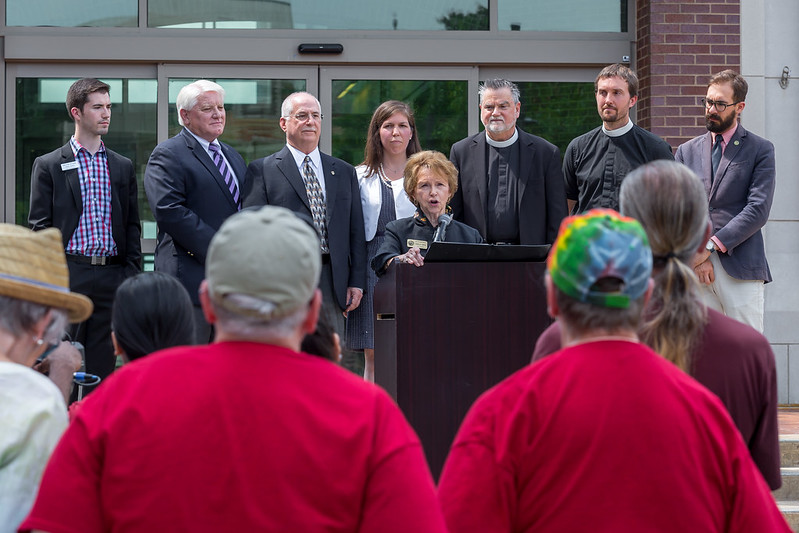
During the introduction of the city’s Uniform Civil Rights Protection ordinance, then-City Council member Adella Gray was joined by (from left) Chaz Allen, president of the NWA Center for Equality; Steve Clark, president of the Fayetteville Chamber of Commerce; Mark Martin, an attorney at the Martin Law Firm; Danielle Weatherby, Assistant Professor of Law at the University of Arkansas; Lowell Grisham, rector of St. Paul’s Episcopal Church; Clint Schnekloth, lead pastor at Good Shepherd Lutheran Church; and Matthew Petty, Fayetteville City Council member in Ward 2.
Photo: Todd Gill, Flyer staff
The Arkansas Supreme Court has denied a request to reconsider its decision that Fayetteville cannot enforce its voter-approved civil rights ordinance.
The law prohibits business owners and landlords from firing or evicting someone because of their sexual orientation or gender identity. Churches, religious schools and daycare facilities, and religious organizations are exempt from the ordinance.
Fayetteville City Attorney Kit Williams requested a re-hearing of the case after the court ruled against the ordinance in February.
At the time, Williams said while re-hearings are rarely approved, he felt the court should at least listen to the city’s argument, which he said was never addressed.
The ordinance was passed in 2014, but later repealed in a special election.
Lawmakers responded by passing Act 137 which prevents Arkansas cities from passing ordinances that include protections not already mentioned by established state law.
A new ordinance was brought forth that local officials believed did not violate the new law. It was sent directly to voters, who approved the new measure in 2015.
The new law was immediately challenged and upheld in circuit court, but then was appealed by Arkansas Attorney General Leslie Rutledge and eventually defeated.
Williams last week said in a memo while the refusal to reconsider is likely the end of the saga, the ordinance was still successful in its three-and-a-half-year lifespan.
During public comments leading up to the passage of the ordinance, the City Council heard from groups of LGBT residents who said they’d been discriminated against at work and in their home life in Fayetteville.
Williams noted that after Fayetteville citizens voted to approve the ordinance, not a single case of discrimination had to be heard by the Fayetteville Civil Rights Commission. Williams said it was a sign that no employer, landlord, or shop owner wanted to discriminate or be known to discriminate against LGBT residents.
“Even though the Attorney General, the Legislature and the Arkansas Supreme Court appear to believe in a supposed right to discriminate against our LGBT citizens, it is clear in Fayetteville that such unfair discrimination will not be tolerated even if we cannot enforce an ordinance to protect our fellow citizens,” said Williams.
Williams said although Act 137 was presented as legislation to improve intra-state economics, in reality, it was designed specifically to prevent cities from protecting LGBT citizens from discrimination.
Williams compared the support of Act 137 to a sandcastle soon to be washed away by a rising tide. Eventually, he said, “our children will wonder why the Legislature, the Attorney General and the Supreme Court chose to support the dark side of discrimination rather than the hope of equality.”
“The side supporting the right to discriminate think they have won the battle,” Williams said. “But Fayetteville won the peace when we chose hope, not fear; love, not hate; equality, not discrimination.
“The friends and allies of discrimination may not realize that those who seek hope and love and equality do not give up easily; nor will we drop the banner of freedom and justice while any unfair discrimination is inflicted upon our citizens.”

